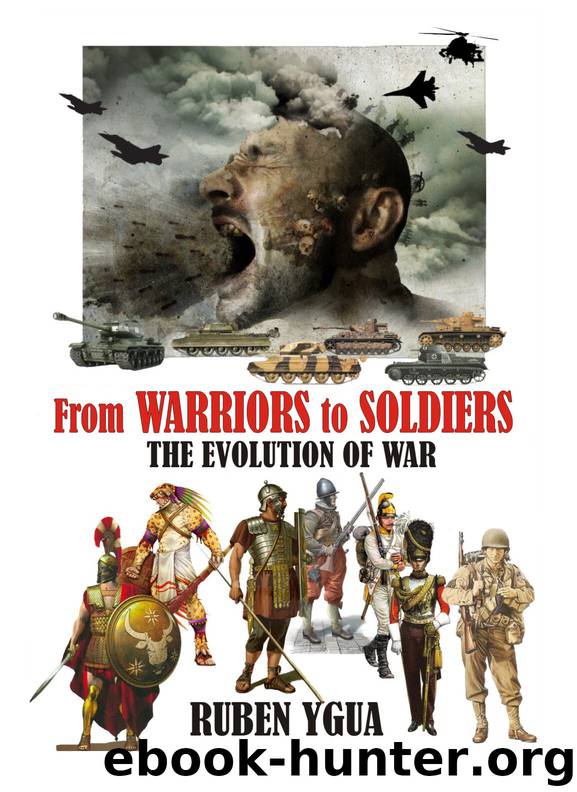From WARRIORS to SOLDIERS: THE EVOLUTION OF WAR by Ygua Ruben

Author:Ygua, Ruben [Ygua, Ruben]
Language: eng
Format: epub
Published: 2020-02-08T16:00:00+00:00
In the early afternoon, thousands of bodies lay on the hillside, and the defenders held their positions.
Then a natural phenomenon intervened, changing the outcome of the battle. In that region, until today, hurricane blasts of wind rise up the mountain gorges, coming from the cold valleys, towards the Adriatic.
The cause is the difference in temperature caused by the altitude. This wind is known as Bora by the local inhabitants today, and can reach over 100 K/h. At one point during the battle, the wind blew strongly, driving Theodosius' legionnaires up the slope during the attack, while throwing dirt and dust, obstructing the vision of Eugene's troops.
Blinded by the winds, the lines of Arbogastes broke and Theodosius won the decisive victory as the Egyptian monk prophesied.
After the battle, Eugene was captured and brought before the emperor. His pleas for mercy were rejected and he was beheaded. Arbogastes escaped defeat and fled to the mountains, but after a few days, he concluded his flight with suicide.
CONSEQUENCES
It was a costly but total victory for Theodosius and a total defeat for the pagans. The western provinces quickly submitted to Theodosius who became the last emperor of a united empire.
Most significantly, the battle was the last desperate attempt to dispute the Christianization of the empire, its outcome deciding the implantation of Christianity in the western Empire. The battle is on a par with the battle of the Milvian Bridge in importance, because it was seen as a victory in a civil war and also as a justification for Christianity to be consolidated. After this battle a generation of the Roman elite pagan families would end any serious resistance against Christianity.
Unfortunately, the battle also accelerated the collapse of the Roman army in the west. The legions were already losing their effectiveness due to the reorganizations and declining quality of their training and discipline, and the losses in the battle of Frigid further weakened the western legions whose task of defending the empire from the barbarian invaders was much harder than those in the east. This decline in the capacity of Roman soldiers meant an increase in the Western Empire's confidence in the barbarian mercenaries employed as Federates, who often proved to be unreliable.
THE NEW ERA OF HEAVY CAVALRY
After the disaster of Adrianople in 378, the decline accelerates in Rome. Between the 4th and 5th centuries, barbarian elements are recruited on a large scale, transforming the ancient Legion. The discipline collapses; the use of lorica segmentata and metal helmets is abandoned. Constantine gave the final blow to the traditional Roman army by introducing the Central Cavalry Force, reducing the infantry to the role of a simple border guard, composed of colonist- soldiers.
The armored knight armed with spear, bow and arrows, and long sword, positions himself as the new king of the battles.
However, once again there was a sign that was not properly analyzed by the generals: the light cavalry of Attila's Huns repeatedly defeated the armored cavalries of the different peoples; if a great empire was not born it is only due to the lack of organization of the Huns and the unexpected death of Attila.
Download
This site does not store any files on its server. We only index and link to content provided by other sites. Please contact the content providers to delete copyright contents if any and email us, we'll remove relevant links or contents immediately.
| Africa | Americas |
| Arctic & Antarctica | Asia |
| Australia & Oceania | Europe |
| Middle East | Russia |
| United States | World |
| Ancient Civilizations | Military |
| Historical Study & Educational Resources |
The Daily Stoic by Holiday Ryan & Hanselman Stephen(3299)
The Fate of Rome: Climate, Disease, and the End of an Empire (The Princeton History of the Ancient World) by Kyle Harper(3055)
People of the Earth: An Introduction to World Prehistory by Dr. Brian Fagan & Nadia Durrani(2727)
Ancient Worlds by Michael Scott(2682)
Babylon's Ark by Lawrence Anthony(2671)
The Daily Stoic by Ryan Holiday & Stephen Hanselman(2568)
Foreign Devils on the Silk Road: The Search for the Lost Treasures of Central Asia by Peter Hopkirk(2454)
India's Ancient Past by R.S. Sharma(2450)
MOSES THE EGYPTIAN by Jan Assmann(2411)
The Complete Dead Sea Scrolls in English (7th Edition) (Penguin Classics) by Geza Vermes(2270)
The Earth Chronicles Handbook by Zecharia Sitchin(2226)
Lost Technologies of Ancient Egypt by Christopher Dunn(2222)
24 Hours in Ancient Rome by Philip Matyszak(2078)
Alexander the Great by Philip Freeman(2064)
Aztec by Gary Jennings(2021)
The Nine Waves of Creation by Carl Johan Calleman(1912)
Curse Tablets and Binding Spells from the Ancient World by Gager John G.;(1860)
Before Atlantis by Frank Joseph(1849)
Earthmare: The Lost Book of Wars by Cergat(1819)
